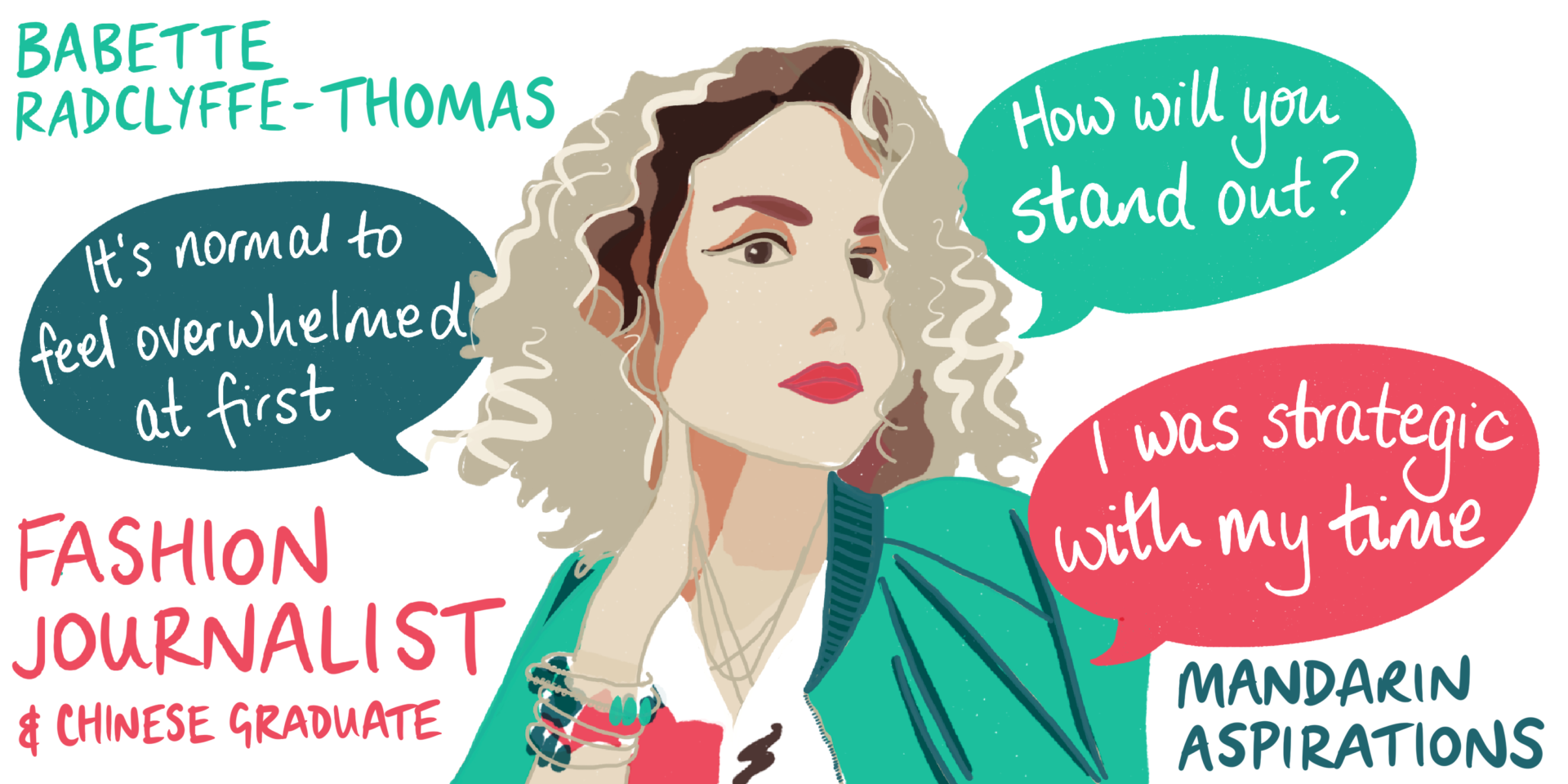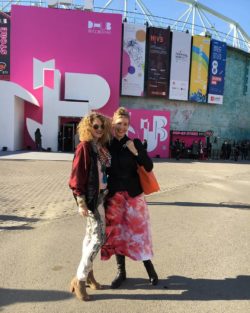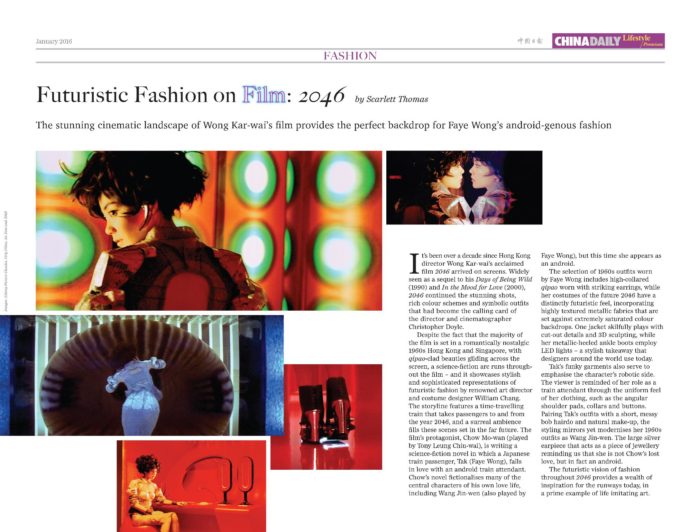Using Chinese in your career: fashion journalist Babette Radclyffe-Thomas

Babette Radclyffe-Thomas studied Chinese at the University of Leeds, graduating in 2012. She is now an award-winning freelance journalist who has worked at Vogue China and Prestige and written fashion and beauty columns for China Daily.
She is also currently working towards a PhD at the London College of Fashion, writing her dissertation on fashion, gender and identity in China.

Babette at Beijing Fashion Week with her mother Natascha
Babette has always had an interest in fashion, having grown up around the industry with her mother, fashion designer Natascha Radclyffe-Thomas.
Professor Natascha Radclyffe-Thomas gave a guest lecture called 'China Fashion Now' in July - read more and watch the recording.
Developing other interests alongside Chinese
Whilst studying at Leeds, Babette wrote fashion content for the student newspaper, as well as running her own bilingual fashion blog.
I would advise anyone studying Chinese to try and develop some sort of other interest or skill outside of Chinese language.
In order to balance her Chinese degree with other interests, Babette had to allocate strict blocks of time. She admits that she has had to postpone a lot of things in order to be successful, whether that was only seeing friends after 5pm or strategically combining Chinese practice with social activities to make the most of her time!
Identifying which Mandarin job will be right for you
It’s really important when you’re choosing a career to work out what you might suit and what you might not suit.
Babette spent three months considering a career in the Foreign Office. She eventually realised that her personality wasn’t suited to a career in diplomacy, deciding that her true goal was to work in the fashion industry and enrolling on a master’s course in Fashion Journalism at the London College of Fashion.
Finding opportunities and building your network
Say yes to everything - you never know how something will help you!
Babette stressed the importance of making the most of opportunities, particularly throughout your degree. Whilst on her year abroad in Beijing, she worked for Lifestyle magazine, and suddenly found herself in an office speaking to people in Chinese about page layouts and images.
This experience at a fashion magazine was a key element that brought her into the career she works in today – and it is an opportunity she wouldn’t have had without proactively reaching out to people online after arriving in Beijing
I made the decision when I moved to Beijing that I was going to be very strategic with my time.
Knowing that she would have plenty of time to see her Leeds friends back home, Babette made a conscious effort to develop other friendships including with her Korean flatmates. She also attended events to widen her network in Beijing.
Reflecting on past opportunities, Babette remembered being offered an editor role by someone who had remembered her from an internship 10 years before. She emphasised the advantages of keeping in touch with people, using LinkedIn and other tools.
How Mandarin skills help Babette in her career
None of Babette’s jobs have explicitly required Chinese language skills, but she has found Mandarin to be a really helpful addition. For example when attending Beijing Fashion Week she is able to actually speak to designers there.
As a Chinese speaker, Babette is able to research a subject more thoroughly – which can also help her to find a different angle on a story. This makes her well-placed to do writing and consultancy work that meets the demand for information about Chinese consumers coming from English-language publications and brands entering China.
That has been my niche; writing in English about China but with some first-hand Chinese research.
Babette is currently working towards a PhD at the London College of Fashion, writing her dissertation on fashion, gender and identity in China. Her Mandarin skills enable her to use first-hand sources in her research and gain a more nuanced view of her subject.

A China Daily article written by Babette
The personal benefits of speaking Chinese
Aside from helping in her career, Babette also values the more personal benefits that learning Mandarin has given her, such as making friends and travelling.
While acknowledging that there is a lot of effort involved in learning Chinese (“enjoy is quite difficult with Chinese language because it is so hard!”), she enjoys the fruits of that effort:
I enjoy being able to speak to friends, I like being able to travel, being able to get a taxi and order things in a restaurant - those are the things that make it worthwhile.
Staying motivated to study Chinese
Babette’s interest in the topics that she researches drives her to persevere with the hard task of reading Mandarin. She enjoys reading Vogue China content, and recommends authors Eileen Chang and Lu Xun (in Chinese) and Xinran and Jung Chang (who she reads in English).
Finding a topic you’re interested in will help you to study anything well and keep it going.
After coming across a new turn of phrase in a Chinese film, Babette will pause it to repeat what she heard, attempting to imitate the delivery and accent too.
Babette’s tips for other Mandarin learners
Work out what success means to you
It’s never good in life to compare yourself to other people.
Babette encourages Mandarin learners to focus on how to stand out, rather than focusing on the competition. Work out what success means to you and aim to find your own niche.
Consider taking the HSK
I suggest that anyone do the HSK - it is a really clear communication to employers of what level your Chinese is.
Babette explained that employers may find it difficult to understand what level your Chinese is when you have a degree, because of differences between universities. She said that the HSK is a standardised indication of your Mandarin proficiency and is a really helpful qualification to have.
Develop your personal brand
Be visible online, be where an employer or recruiter can find you.
Although learning Mandarin is an impressive and positive aid to your employability, Babette urges students to not just learn Chinese and expect employers to come to you. She recommends having an online presence and making yourself accessible to potential employers. Babette is active on Twitter, Instagram and LinkedIn, as well as maintaining an online portfolio.
Remember you're not alone
A lot of people feel quite overwhelmed at first.
Babette does not shy away from the fact that Mandarin is a difficult language.
A lot of people, especially in the first year of a Mandarin degree, can feel quite overwhelmed by how hard Chinese is at times. It can help you to persevere when you acknowledge this and understand that everybody goes through this.
Babette emphasised that it is important not to be scared to say something wrong, and not to let the difficulty of Mandarin hold you back. Although Mandarin has its challenges, she chooses to focus on the fun side of learning, and work towards goals that interest and excite her.
Your Chinese is never going to be 100% perfect but try not to be held back by that.
Read more Mandarin Aspirations stories
